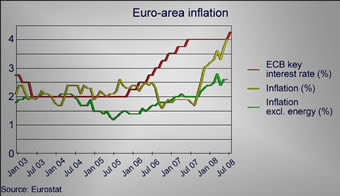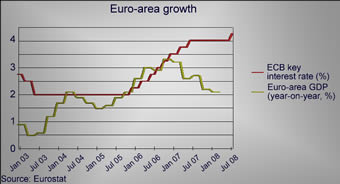The meeting of EU economy and finance ministers (ECOFIN) on Friday is aimed at finding meaningful solutions to Europe’s economic problems -– but is more likely to reveal divisions among member states about the structure of European economic governance.
At the request of the French EU presidency, the meeting will now discuss possibilities for a coordinated response to the threat of Europe-wide recession. Yet what the French really want is a change in the EU’s economic governance, especially in monetary policy.
This, in the euro-area, is the sole responsibility of the independent European Central Bank (ECB), whose mandate is to solely ensure price stability, of about 2% inflation, using its tools of interest rates and liquidity injections into the market.

The recent economic slowdown has fuelled an old (French-originated) debate questioning these fundamentals, namely:
- whether the ECB’s mandate should also include a provision of maintaining economic growth; and
- whether euro-area politicians should have some say in how ECB monetary policy is set.
While there might be good reasons to broaden the ECB’s mandate at a time when weak growth makes its inflation focus appear myopic, changing its independence from policymakers would have serious consequences. Yet the two issues are interlinked and cannot be easily separated.
The broader competences of the ECB are closer to those traditionally left to governments, and the fear is that the body could be given more power, only to be criticised for unrepresentative use of them, leading to greater member state control of the body. Even a step as apparently unobjectionable as releasing the minutes of ECB board deliberations is controversial: since that small act of transparency would make members from particular states more answerable to their home governments and less able to shelter behind a group decision.

The French demands were at the time quickly rejected by the ECB, the European Commission and most euro-area members (all of whom would need to agree to change the ECB’s mandate), but have recently gained new momentum. The economy is slowing rapidly, the euro is still strong and the ECB now admitted that its injections of liquidity into financial markets may have led to distortions.
Discussions about changing the structure of European economic governance will do little to address the real problems faced by European economies. Moreover, a common policy response to the real problem will be difficult to find -- because most countries have already exhausted fiscal measures, because tax measures are off EU-limits, and ultimately because the origins of member states’ economic problems differ so widely that a common response would be futile. Bringing the ECB to heel wins domestic popularity, but it is barking up the wrong tree.
fecha |
Título |
16/10/2009| |
|
25/03/2009| |
|
13/03/2009| |
|
13/03/2009| |
|
07/03/2009| |
|
07/03/2009| |
|
03/03/2009| |
|
03/03/2009| |
|
01/03/2009| |
|
01/03/2009| |
|
01/03/2009| |
|
01/03/2009| |
|
01/03/2009| |
|
01/03/2009| |
|
03/01/2009| |
|
29/12/2008| |
|
29/12/2008| |
|
30/11/2008| |
|
30/11/2008| |
|
30/11/2008| |
|
30/11/2008| |
|
30/11/2008| |
|
30/11/2008| |
|
30/11/2008| |
|
30/11/2008| |
|
25/11/2008| |
|
25/11/2008| |
|
21/10/2008| |
|
21/10/2008| |
|
21/10/2008| |
|
21/10/2008| |
|
18/10/2008| |
|
18/10/2008| |
|
18/10/2008| |
|
18/10/2008| |
|
18/10/2008| |
|
18/10/2008| |
|
18/10/2008| |
|
18/10/2008| |
|
18/10/2008| |
|
18/10/2008| |
|
05/10/2008| |
|
05/10/2008| |
|
03/10/2008| |
|
03/10/2008| |
|
15/09/2008| |
|
15/09/2008| |
|
15/09/2008| |
|
15/09/2008| |
|
15/09/2008| |
|
15/09/2008| |
|
15/09/2008| |
|
15/09/2008| |
|
15/09/2008| |
|
15/09/2008| |
|
15/09/2008| |
|
15/09/2008| |
|
15/09/2008| |
|
15/09/2008| |
|
15/09/2008| |
|
15/09/2008| |
|
06/09/2008| |
|
06/09/2008| |
|
05/09/2008| |
|
05/09/2008| |
|
28/08/2008| |
|
28/08/2008| |
|
22/08/2008| |
|
22/08/2008| |
|
10/08/2008| |
|
10/08/2008| |
|
10/08/2008| |
|
10/08/2008| |
|
09/08/2008| |
|
09/08/2008| |
|
26/07/2008| |
|
26/07/2008| |
|
11/07/2008| |
|
11/07/2008| |
|
11/07/2008| |
|
11/07/2008| |
|
11/07/2008| |
|
11/07/2008| |
|
11/07/2008| |
|
11/07/2008| |
|
11/07/2008| |
|
11/07/2008| |
|
30/06/2008| |
|
30/06/2008| |
|
30/06/2008| |
|
30/06/2008| |
|
30/06/2008| |
|
30/06/2008| |
|
27/05/2008| |
|
27/05/2008| |
|
27/05/2008| |
|
27/05/2008| |
|
19/05/2008| |
|
19/05/2008| |
|
18/05/2008| |
|
15/05/2008| |
|
14/05/2008| |
|
14/05/2008| |
|
09/05/2008| |
|
09/05/2008| |
|
08/05/2008| |
|
08/05/2008| |
|
06/05/2008| |
|
06/05/2008| |
|
06/05/2008| |
|
05/05/2008| |
|
05/05/2008| |
|
30/04/2008| |
|
30/04/2008| |
|
29/04/2008| |
|
29/04/2008| |
|
25/04/2008| |
|
24/04/2008| |
|
24/04/2008| |
|
24/04/2008| |
|
24/04/2008| |
|
24/04/2008| |
|
24/04/2008| |
|
21/04/2008| |
|
21/04/2008| |
|
21/04/2008| |
|
21/04/2008| |
|
21/04/2008| |
|
06/04/2008| |
|
06/04/2008| |
|
05/04/2008| |
|
04/04/2008| |
|
04/04/2008| |
|
04/04/2008| |
|
04/04/2008| |
|
04/04/2008| |
|
28/03/2008| |
|
28/03/2008| |
|
26/03/2008| |
|
16/03/2008| |
|
14/03/2008| |
|
14/03/2008| |
|
12/03/2008| |
|
12/03/2008| |
|
11/03/2008| |
|
11/03/2008| |
|
11/03/2008| |
|
11/03/2008| |
|
04/03/2008| |
|
03/03/2008| |
|
03/03/2008| |
|
28/02/2008| |
|
28/02/2008| |
|
28/02/2008| |
|
27/02/2008| |
|
20/02/2008| |
|
19/02/2008| |
|
18/02/2008| |
|
17/02/2008| |
|
17/02/2008| |
|
17/02/2008| |
|
27/12/2007| |
|
07/10/2007| |
|
12/09/2007| |
|
30/08/2007| |
|
30/08/2007| |
|
22/08/2007| |
|
20/08/2007| |
|
31/07/2007| |
|
14/07/2007| |
|
10/07/2007| |
|
23/05/2007| |
|
23/05/2007| |
|
16/05/2007| |
|
16/05/2007| |
|
09/05/2007| |
|
09/05/2007| |
|
17/01/2007| |
|
17/01/2007| |
|
20/12/2006| |
|
20/12/2006| |
|
05/12/2006| |
|
05/12/2006| |
|
29/11/2006| |
|
29/11/2006| |
|
24/10/2006| |
|
05/08/2006| |
|
03/08/2006| |
|
28/07/2006| |
|
27/07/2006| |
|
20/07/2006| |
|
01/02/2006| |
|
01/02/2006| |
|
01/02/2006| |
|